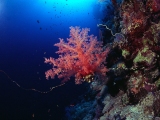05 March 2008
Scientists Reveal First-Ever Global Map of Total Human Effect on Oceans
 More than 40 percent of the world's oceans are heavily affected by human activities, and few if any areas remain untouched, according to the first global-scale study of human influence on marine ecosystems.
More than 40 percent of the world's oceans are heavily affected by human activities, and few if any areas remain untouched, according to the first global-scale study of human influence on marine ecosystems.By overlaying maps of 17 different activities such as fishing, climate change and pollution, the researchers have produced a composite map of the toll that humans have exacted on the seas.
The work, published in Science, was conducted at the National Science Foundation (NSF)'s National Center for Ecological Analysis and Synthesis (NCEAS) at the University of California at Santa Barbara, and involved 19 scientists from a range of universities, NGOs, and government agencies.
The study synthesized global data on human impacts to marine ecosystems such as coral reefs, seagrass beds, continental shelves and the deep ocean.
"This research is a critically needed synthesis of the impact of human activity on ocean ecosystems," said David Garrison, biological oceanography program director at NSF. "The effort is likely to be a model for assessing these effects at local and regional scales."
Past studies have focused largely on single activities or single ecosystems in isolation, and rarely at the global scale. In this study the scientists were able to look at the summed influence of human activities across the entire ocean.
"This project allows us to finally start to see the big picture of how humans are affecting the oceans." said lead scientist Ben Halpern of NCEAS. "Our results show that when these and other individual impacts are summed up, the big picture looks much worse than I imagine most people expected. It was certainly a surprise to me."
The study reports that the most heavily affected waters in the world include large areas of the North Sea, the South and East China Seas, the Caribbean Sea, the east coast of North America, the Mediterranean Sea, the Red Sea, the Persian Gulf, the Bering Sea and several regions in the western Pacific. The least affected areas are largely near the poles.
Human influence on the ocean varies dramatically across various ecosystems. The most heavily affected areas include coral reefs, rocky reefs and seamounts. The least impacted ecosystems are soft-bottom areas and open-ocean surface waters.
"My hope is that these results serve as a wake-up call to better manage and protect our oceans, rather than a reason to give up," added Halpern.
-
What do you think of this news item? Start a discussion.
Bookmark with: del.icio.us | Digg | Newsvine | NowPublic | Reddit
|
--
Subscribe to SCUBA News (ISSN 1476-8011) for more free news, articles, diving reports and marine life descriptions - http://www.scubatravel.co.uk/news.html

Labels: environment, marine biology, research
 Subscribe to SCUBA News (ISSN 1476-8011) for more news, articles, diving reports, reviews and marine creature of the month.
(SCUBA News is published by SCUBA Travel once a month. Will will keep your e-mail address confidential and only use it to send you the monthly newsletter.)
Subscribe to SCUBA News (ISSN 1476-8011) for more news, articles, diving reports, reviews and marine creature of the month.
(SCUBA News is published by SCUBA Travel once a month. Will will keep your e-mail address confidential and only use it to send you the monthly newsletter.)
